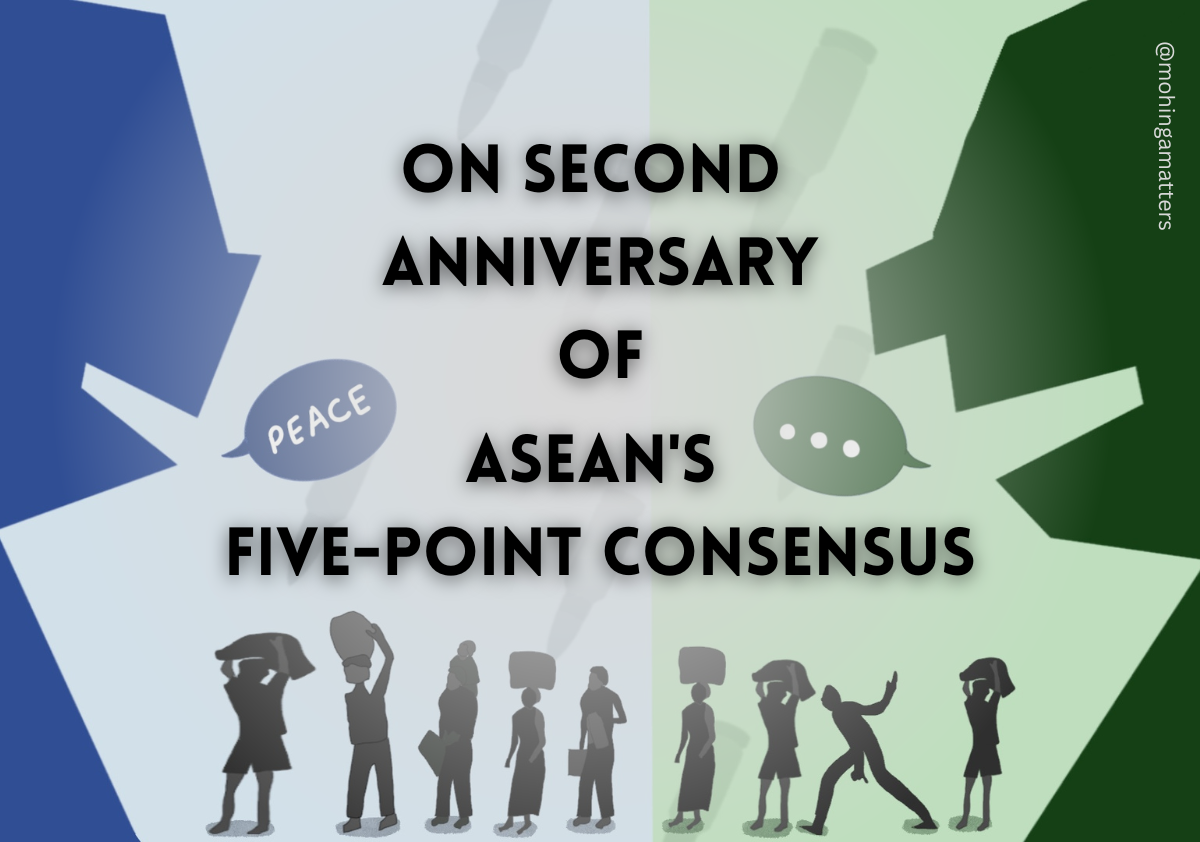
Another April had passed since 2021, and that means another Myanmar New Year which the people refused to celebrate in protest of the coup. However, protesting the new year is not the only remarkable event since 2021, for much-cited ASEAN Five-Point consensus also turned 2 years on April 24, 2023. Three ASEAN Chairmanships have turned since its leaders reached consensus on following noble goals:
1. Cessation of violence
2. Holding constructive dialogue among all parties
3. Appointing a special envoy of ASEAN Chair
4. Providing humanitarian assistance
5. Special envoy to visit Myanmar and meet with all parties concerned.
Currently Indonesia sits in the ASEAN hot seat to the issue where its successors failed. In a way it is obvious that the five-point consensus is doomed to fail since its beginning. Myanmar junta Min Aung Hlaing never showed any interest in taking actions. After using the ASEAN Leaders’ meeting (the only time he was invited and persuaded against violence) as a photo opportunity, he immediately renegades from the consensus upon landing back in Naypyidaw, and claims he is going to pursue his “own five-point plan”, which is later demonstrated as pursuing cessation of violence by ensuring no resistance remained alive, holding dialogue among all parties as long as they submit to his authority, etc.
However, not all failures of the five-point consensus could be attributed to Min Aung Hlaing alone. The ASEAN, by not doing what they can, was also accountable for failure of the consensus. Most obviously, the 10-member bloc, from its part, has consistently failed to meet with “all parties concerned”, despite it being enshrined in the consensus. The ugliest episodes of the ASEAN’s role were witnessed throughout Cambodia’s chairmanship. Cambodian Prime Minister Hun Sen, spent first half of his chairmanship blaming pro-democratic forces and the second half resigning he cannot do anything. Min Aung Hlaing, emboldened by Hun Sen’s act of bestowing legitimacy, intensified his terror campaigns (even during Hun Sen’s visit to Naypyidaw) while giving no concrete concession in turn. Compared to Hun Sen’s time, Indonesia, being a better performing democracy (at least by the ASEAN standards) and being a vocal critics of Min Aung Hlaing, is now in a position to change that, and we genuinely hope Indonesia’s presidency will engage with the National Unity Government (NUG), the most visible stakeholder to seek solution in Myanmar. As a popular quote accredited to Einstein said, “Insanity is doing the same thing, over and over again, but expecting different results”. The previous ASEAN chairs have done insane moves over past two years. The time is long overdue to make something different than engaging with junta alone.
Aside where Cambodia and Indonesia stand on autocracy-democracy spectrum, there is also a practical need towards alleviating the ongoing crisis in Myanmar. Two years ago, when ASEAN leaders agreed the generally written and not time-bound commitments, Min Aung Hlaing seems to be in charge because most of the resistance are unarmed protestors that were easily gunned down. Since then, with the escalation of violence from junta’s side (as opposed to Point 1), the resistance has morphed into armed rebellion. Civilian death has no sign of slowing down. Even the internationally condemned incidents such as Pazigyi Massacre were followed up by another air- and ground-strikes against the same village, and this is just the latest example in junta’s commitment to cessation of violence. However, for all the increased death, poverty and suffering, the junta still cannot have any control. By its own admission, the junta now cannot control two-third of the country.
The result is that, compared to two years ago, we are getting closer to a being failed state, and being a failed state would create shockwaves across the region, from exodus of refugees to being a criminal haven. Ideology and humanitarian aspects aside, the ASEAN and neighboring powers (i.e. China and India) have increasing pragmatic stakes to promote stability in Myanmar now.
For diplomatic solutions, it is understandable that why engagement with the junta is important. However, it is the lack of formal engagement with the NUG, despite the support of the people of Myanmar, that would fail to achieve progress.
Min Aung Hlaing have repeatedly proven that he is not willing to commit to the five-point consensus. If there were any doubts that not antagonizing Min Aung Hlaing by not formally engaging with the NUG could persuade him to take any reforms, the past two years is more than enough to dispel such disillusions. The time for benefits of doubts and excuses is over, now is the time for the ASEAN to show its willingness in doing what’s described in the consensus or risk a failed state in its backyard.

